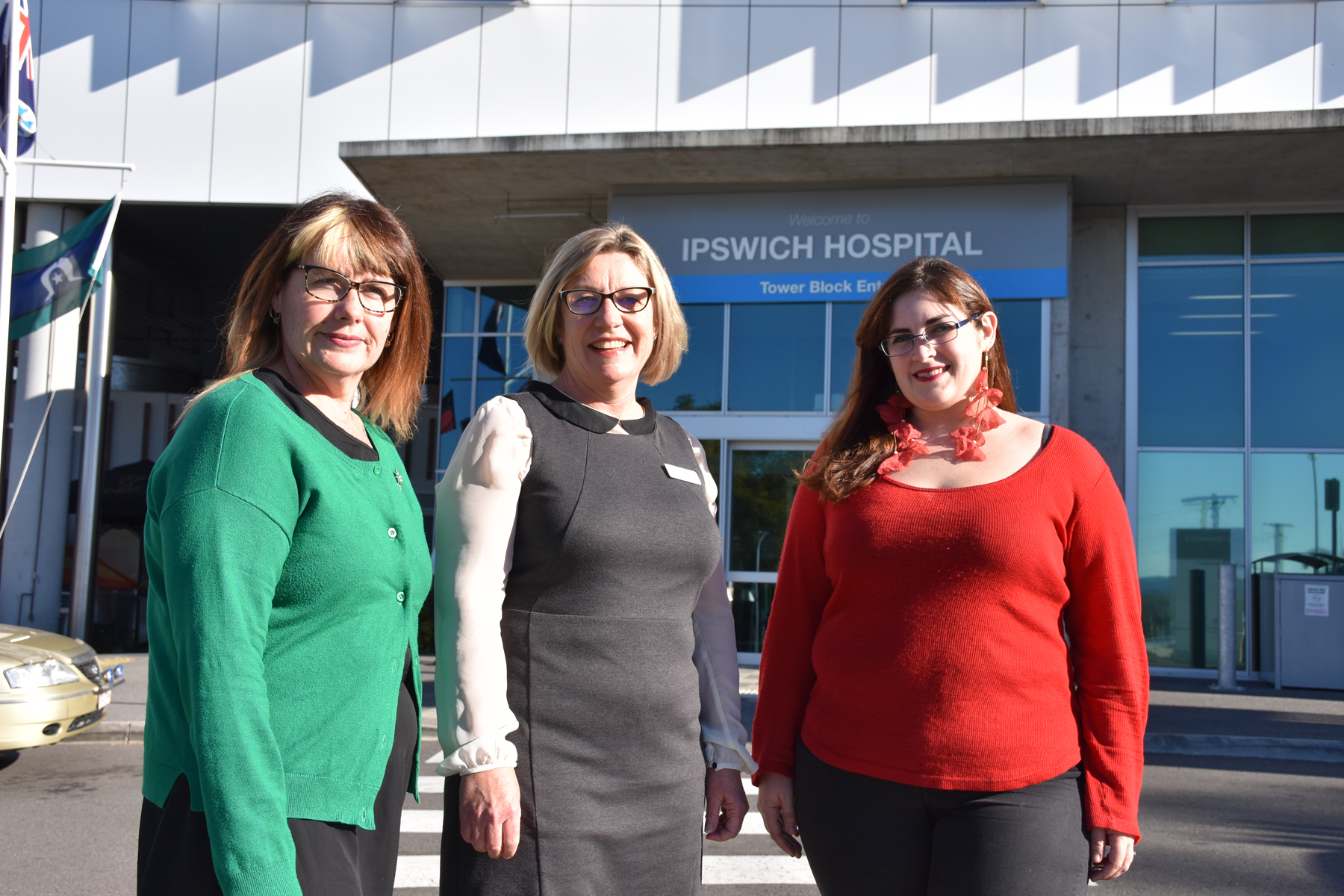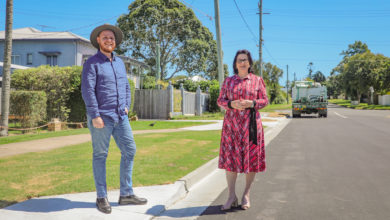
Some of the High Risk team members: West Moreton Health social worker Fiona-Richardson Clarke and Social Work Director Fiona Demnar with Domestic Violence Action Centre (DVAC) Health and Hospital Liaison Joanna.
There have not been any domestic violence deaths in Ipswich since the High Risk Team has been put in place.
West Moreton Health social worker Fiona-Richardson Clarke is a member of the Ipswich High Risk Team, which was set up earlier this year by the State Government, Department of Child Safety, Youth and Women to assess and respond to women and their children at high risk of serious harm or death due to domestic violence.
The specialist team is made up of experienced members from agencies including police, health, corrections, housing, child safety and a range of non-government services who collaborate and share resources and information to develop safety plans that will save and protect the lives of women and children at risk.
“We were brought together to prevent deaths. By sharing information between services we are able to use that to put in place interventions that keep women alive,” she said.
“We can sit down with other agencies and share information about the victim, children and perpetrator, and look at the big picture. What is going on and which services can we put in place to make them safer. We might look at housing, putting a plan in place, offer ongoing care.
“The person who is experiencing the violence knows what is best for them, what services they can access without being placed in greater danger.”
Ms Richardson-Clarke said she was proud of her role helping some of the region’s most vulnerable women.
“I think one of the most rewarding parts is seeing women have that light bulb moment and recognising that fear and abuse is actually not OK or that it’s not what they want for their life,” she said.
“It’s especially common for young women to not realise they are in a domestic violence situation, especially if it is controlling behaviour to undermine women.
“Women, like the rest of society, still see domestic violence in the context of the physical abuse first and foremost, and if they have grown up in a family where domestic violence was common they might not recognise the different types of abuse that are a part of domestic violence.”
Social Work Director Fiona Demnar said since the High Risk Team had formed earlier this year, West Moreton Health has been involved in more than 110 cases to support women assessed as at risk of harm or death.
Ms Demnar said women could be assured their concerns would be acknowledged and believed.
“We’ll work to keep them safe when they access health care,” Ms Demnar said.
“We know that the more frequently someone presents, the more serious the injuries usually become and so we have to be able to respond every time that that person presents to our health service because it will either result in death or long-term health impacts.
“The time to respond to any suspicion of domestic violence is the first time, and every time.’’
Ipswich Hospital was one of 16 sites around Ipswich involved in the Zonta Says No to Violence campaign. The campaign aimed to raise awareness of the widespread issue and challenges the community to join the campaign to end violence against women.
Where to get help
If you are in immediate danger, phone the police on Triple Zero (000).
For help and advice, call:
DVConnect Womensline
1800 811 811
24 hours, 7 days a week
1800RESPECT
Phone 1800 737 732
24 hours, 7 days a week
DVConnect Mensline
1800 600 636
9am to 12 midnight, 7 days a week
Sexual Assault Helpline
1800 010 120
7.30am to 11.30pm, 7 days a week
Elder Abuse Helpline
1300 651 192
9am to 5pm, Monday to Friday
Kids Helpline
1800 551 800
24 hours, 7 days a week
Domestic Violence Action Centre (DVAC) – Ipswich
3816 3000
Monday – Friday 9am – 5pm
“Just do something.”
West Moreton Health social worker Fiona-Richardson Clarke urges everyone to be involved in helping people in domestic violence situations.
“If you are a bystander and you see a situation, depending on what is going on, just do something. Whether it’s giving her a nod, or ringing the police,” she said.
“Take advice from her, you don’t want to put her in more risk. But we as a community need to say it’s not okay anymore.
“If you are being abused and present at hospital ask to speak to the social worker. That is their job and they are here to help.”
What is it?
Domestic and family violence happens when one person in a relationship uses abuse or violence to maintain power and control over the other person.
The abuse is not always physical, it can be emotional, sexual, financial, social, spiritual, verbal, psychological or technology based – or other controlling and threatening behaviours that cause the person being abused to be fearful.
Recognise the signs
Perpetrators of violence are often very good at hiding their behaviour.
Outsiders may never witness an abusive interaction, but instead notice a change in the abused person, or have an instinctual feeling that something isn’t right.
Some signs may be that the abused person seems afraid of their partner or is always very anxious to please them. They may stop seeing friends and family. They may have a partner who is always phoning or texting to check on them. They may be reluctant to leave their children with their partner. They may say their partner or carer gives them no access to money, makes them justify every cent that is spent or makes them hand over their money.
What can I do?
Depending on the situation, talk to the person at risk. Offer support. Make yourself aware of support services available and let them know what is available and how to access it. If there is any physical risk of violence you should always call the police on triple zero (000).

